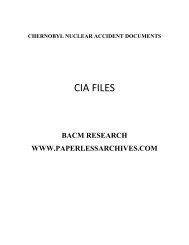national security agency journal articles world war ii german ...
national security agency journal articles world war ii german ...
national security agency journal articles world war ii german ...
You also want an ePaper? Increase the reach of your titles
YUMPU automatically turns print PDFs into web optimized ePapers that Google loves.
UNCLASSIFIED<br />
David Kahn<br />
The German Comint Organization<br />
in World War II<br />
A German interpreter hunched over and listened<br />
intently to the Russian voice in his earphones. It came<br />
from a loop of wire that members of a wiretapping squad<br />
had set out two weeks before to intercept Soviet field<br />
telephone conversations.<br />
All around him, that winter's day early in 1942,<br />
German forces tightened their steel grip around<br />
Sevastopol, a key port on the Black Sea. But the Russians<br />
defended their Crimean fortress with toughness and<br />
tenacity. Like a bear swiping at his tormentors with his<br />
paws, they struck out at the Germans in a series of<br />
counterattacks. The interpreter's unit, the 24th Infantry<br />
Division, had suffered many of these for the past week.<br />
In this positional <strong>war</strong>fare, it was the chief duty of the<br />
wiretapping squad to preclude surprise attacks by<br />
eavesdropping on enemy talk that would give hints of<br />
Russian intentions. To this end, members of the squad<br />
had, after the suspension of the first systematic German<br />
offensive against Sevastopol, when Russian counterattacks<br />
might be expected, crawled to the Russian lines on 7<br />
January and left there a loop of wire. One of three such<br />
loops, it did not actually connect to the enemy wires, but<br />
detected the return speech currents in the earth, like the<br />
Arendt apparatus of World War I. It thus picked up, not<br />
the distinct conversations of a single line, but some 20<br />
telephone stations with consequent cross-talk and hum.<br />
For the first week, it produced general intelligence on<br />
enemy equipment and supplies, replacements and their<br />
instructions, observations, morale, losses, and battle<br />
measures. Twice it enabled the Germans to save their<br />
scouts, once from enemy gunfire, once from encirclement,<br />
by alerting them that the Russians had spotted the<br />
patrols.<br />
On 15 January the Russians began a week-long series<br />
of attacks aimed particularly at winning observation<br />
posts that would overlook the German rear, as<br />
well as tying down and weakening German forces.<br />
The Germ~n wiretappers provided clues that helped alert<br />
This was taken from a chapter of Mr. Kahn's new book,<br />
Hitler's Oracles. Used with permission of the author.<br />
their division to Russian activities. They heard a speaker<br />
asking "Where am I going to get some schnapps?" and<br />
another promising to fire "very, very much" on a bunker.<br />
On 21 January, the attacks started early in the morning.<br />
The battles flamed in close combat along the main trench<br />
line, and at one point the Russians broke through, only to<br />
be quickly thrown back. During the early afternoon a<br />
pause set in. The infantrymen waited uncertainly, not<br />
knowing whether they were through fighting for the day<br />
or whether the Russians would suddenly rain shells upon<br />
them and follow with a renewed onslaught.<br />
At 4 p.m. the interpreter heard Russian Post 21 calling<br />
all company commanders to the telephone. After some<br />
indistinct expressions, he heard the commander at Post 21<br />
say clearly:<br />
"Forty-five minutes left till chen."<br />
Ten minutes later, a Russian telephone speaker asked<br />
another:<br />
"Usina! When are we supposed to begin again?"<br />
To which the reply came:<br />
"In 35 minutes."<br />
The interpreter reported this to the divisional G2, who<br />
correctly interpreted it as another attack. The troops were<br />
alerted. As the Russians assembled their companies, the<br />
artillery of the 24th, of the neighboring 50th Infantry<br />
Division, and of the corps brought them under fire.<br />
When they finally attacked in battalion strength, only<br />
weak leading elements even reached the main German<br />
lines, and the infantry repulsed them with their light<br />
weapons. The Russians returned to the attack in several<br />
uncoordinated pushes but were repeatedly thrown back.<br />
Ar 6:45 they finally gave up, returning to their original<br />
positions and leaving the Germans firmly in control of<br />
their main lines.<br />
The German Staff declared the next day: "Wiretap<br />
reconnaissance again achieved important results in the<br />
enemy attacks on 21 January, creating the basis for their<br />
successful <strong>war</strong>ding off. In defense, wiretap reconnaissance<br />
is of controlling importance, which is widely recognized<br />
by the combat troops."<br />
UNCLASSIFIED 3
















